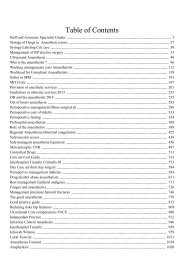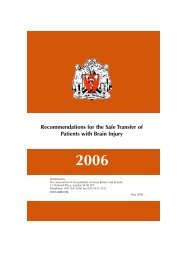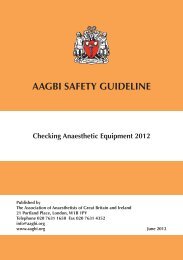TheatrePracticeStandardsGeneric1
Create successful ePaper yourself
Turn your PDF publications into a flip-book with our unique Google optimized e-Paper software.
Donor Transplant Coordinators<br />
• Are responsible for the care of a patient who has died, speaking to the family and<br />
organising the organ donation procedure.<br />
• The Theatre Manager will retain copies of signatures of all healthcare professionals<br />
who make entries on healthcare records, together with the professional's registration<br />
number (NMC or HPC). The register of signatures will be reviewed and updated<br />
annually.<br />
In the Event of an Unexpected Death Occurring in Theatre<br />
• If an unexpected death occurs within the perioperative environment the person in<br />
charge must ensure that the following personnel are informed immediately, in order to<br />
comply with the requirements:<br />
o<br />
o<br />
o<br />
Theatre Manager<br />
Ward and/or intensive care staff<br />
It is the responsibility of the medical staff to inform their senior colleagues<br />
• The surgeon must inform the Coroner’s Office. A medical certificate will not be issued.<br />
• It is the surgeon’s decision to decide whether to continue with the operating session or<br />
to cancel the remainder of the operating for that session.<br />
• Sudden unexpected death will result in a coroner’s post mortem as a legal requirement.<br />
• Post mortem examination can provide information about the illness or other cause of<br />
death. Without a post mortem, the cause of death can be wrong in up to 30% of cases<br />
• By law a coroner can order a post mortem examination to be done. There are three<br />
main reasons why a death is referred to the coroner:<br />
o<br />
o<br />
o<br />
Death has been sudden and unexpected.<br />
A person has been ill but the doctor confirming the death is not certain why it<br />
happened at that particular time.<br />
A death has been the result of an accident or unusual circumstances (including<br />
deaths following a medical procedure such as surgery).<br />
• If a member of theatre staff is approached by a relative, or other responsible person,<br />
about post mortem arrangements for adults, the request should be referred directly to a<br />
member of the medical team responsible for the deceased or the Bereavement office,<br />
as appropriate.<br />
Organ Donation<br />
• If the patient had previously agreed/consented to organ donation, immediate advice<br />
must be sought from the coroner, via the consultant in charge, or from the coroner's<br />
office. The coroner must be told and must agree before organs can be removed. In<br />
some cases, organ donation may not be possible for medical reasons.<br />
In The Event of an Unexpected Death Occurring in St Michael’s Hospital Theatres (in<br />
addition to the above guidelines)<br />
• The body will be removed by the coroner and medical certificate issued after post<br />
mortem and inquest.<br />
• The Coroner will arrange for the body to be collected.<br />
• If there is gross contamination by body fluids, the deceased patient should be washed.<br />
49





